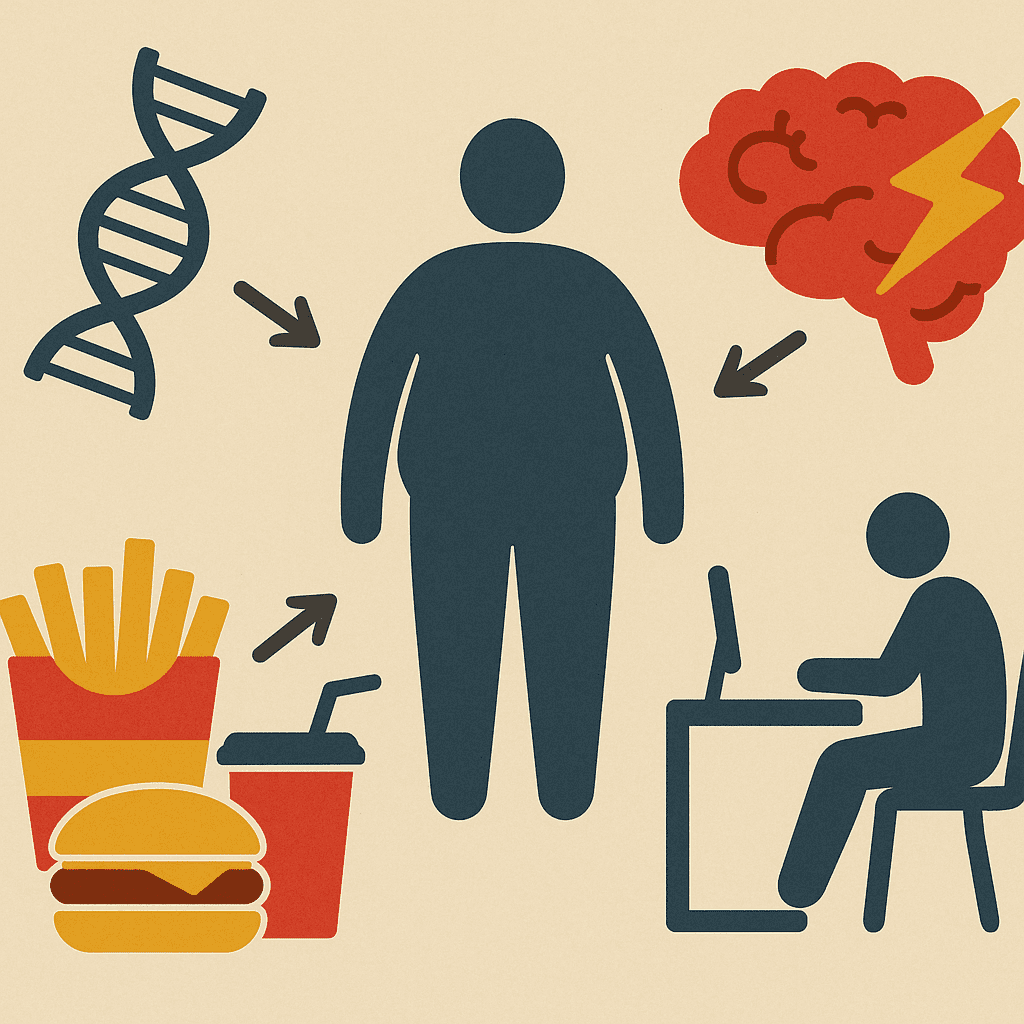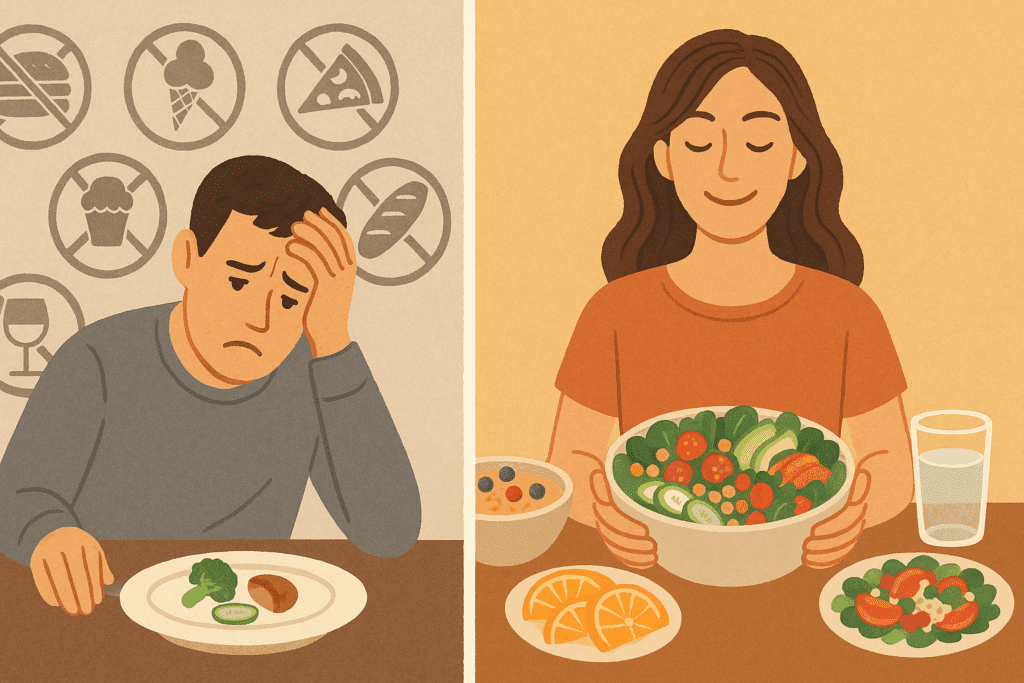In a world saturated with quick fixes and fad diets, the journey toward sustainable weight loss often becomes clouded by conflicting advice and unrealistic expectations. The question of how to stop being fat is one that many people grapple with, not out of vanity, but from a genuine desire to reclaim their health, confidence, and overall quality of life. In the pursuit of lasting change, it is essential to move beyond shame-driven narratives and instead embrace science-based, compassionate strategies rooted in mindful eating and lifestyle balance. This guide offers an evidence-informed, expert-grounded roadmap to healthy weight management through sustainable nutritional habits and long-term behavior change.
You may also like: How to Stop Emotional Eating and Regain Control: Mindful Nutrition Strategies That Support a Healthier Lifestyle

Understanding the Roots of Weight Gain
Weight gain is often more complex than a simple equation of calories in versus calories out. While energy balance remains a core principle, it’s crucial to acknowledge the physiological, psychological, and environmental factors that influence body weight. Genetics play a significant role in determining body type and metabolic rate. Some individuals may have a genetic predisposition to store fat more easily or experience a slower metabolism, making it harder to lose weight despite dietary efforts. However, genes are not destiny—they interact dynamically with lifestyle choices.
Emotional eating and chronic stress are two major contributors to weight gain that often go unrecognized. Many individuals turn to food as a coping mechanism, particularly high-fat, high-sugar options that stimulate reward centers in the brain. Cortisol, the stress hormone, also promotes fat storage, especially around the abdomen. Furthermore, modern living has normalized sedentary habits and easy access to calorie-dense foods, creating a “toxic” food environment that makes weight gain almost inevitable unless one actively resists these norms.
To understand how to stop being fat in a sustainable and self-compassionate way, one must first dismantle the myths surrounding obesity and examine the multifaceted contributors to body weight. Blame and self-judgment are counterproductive. Instead, an honest, science-driven analysis of your personal patterns and lifestyle context is the first step toward change.

Why Diets Don’t Work—and What Does
Fad diets promise rapid weight loss but typically lead to disappointment and yo-yo dieting. These plans often involve extreme calorie restriction, exclusion of entire food groups, or rigid rules that are hard to maintain. While you might lose weight initially, these approaches rarely support long-term success. Metabolism slows down in response to extreme dieting, and the body may interpret drastic calorie cuts as a threat to survival, leading to increased hunger hormones and decreased satiety signals.
Long-term studies reveal that most people regain the weight they lost—and often gain even more—within a few years. This cycle not only affects physical health but also damages one’s relationship with food and body image. Sustainable weight loss focuses on gradual, consistent changes rather than dramatic overhauls. Developing habits that align with your personal preferences, cultural practices, and lifestyle is more likely to result in lasting change.
Rather than asking how to not be fat through temporary restriction, the more fruitful question is: how can I nourish my body in a way that promotes health, satisfaction, and sustainability? The answer lies in learning to trust your body’s hunger and fullness cues, understanding nutrient density, and prioritizing foods that are both satisfying and nourishing.

The Role of Mindful Eating in Sustainable Weight Loss
Mindful eating is a transformative approach that shifts the focus from external dieting rules to internal cues and awareness. It involves eating with intention and attention—being fully present during meals, savoring flavors, and paying attention to physical hunger and fullness signals. Mindful eating can help interrupt emotional eating patterns and reduce binge episodes by cultivating a non-judgmental relationship with food.
When people eat mindfully, they are less likely to overeat and more likely to choose foods that make them feel good physically and emotionally. Studies have shown that practicing mindful eating can lead to modest weight loss, improved eating behaviors, and greater overall well-being. This method encourages individuals to slow down, chew thoroughly, and engage all the senses while eating, transforming meals from rushed tasks into opportunities for nourishment and pleasure.
Importantly, mindful eating supports the goal of how to not be fat by addressing the root causes of overeating—disconnection from hunger signals, emotional triggers, and mindless consumption. It helps rewire the brain to associate eating with presence rather than guilt, creating a foundation for lasting change.
Building a Balanced, Nutrient-Dense Diet
One of the most empowering strategies for sustainable weight management is focusing on what to add to your plate rather than what to remove. A nutrient-dense diet prioritizes whole, minimally processed foods that deliver essential vitamins, minerals, fiber, and healthy fats. These foods not only promote satiety but also support optimal metabolism, hormone regulation, and overall health.
Lean proteins such as eggs, poultry, fish, legumes, and tofu are critical for muscle maintenance and appetite regulation. Complex carbohydrates like whole grains, fruits, and vegetables provide energy and fiber, which slow digestion and keep you feeling full longer. Healthy fats from avocados, nuts, seeds, and olive oil are vital for hormone balance and satiety. Including fermented foods such as yogurt, kefir, sauerkraut, and kimchi can support gut health, which is increasingly linked to weight regulation.
Rather than adopting an all-or-nothing mentality, aim for consistency and flexibility. No single food causes weight gain on its own. It’s the overall pattern of eating that matters most. Shifting from the question of how to stop being fat to how to create a supportive food environment allows individuals to make empowered choices without restriction or fear.

The Science of Metabolism and How to Support It
Metabolism refers to the chemical processes by which the body converts food into energy. Many people believe their slow metabolism is the reason for weight gain, but in most cases, the issue lies more with lifestyle habits than metabolic abnormalities. However, certain strategies can optimize metabolic health and support energy balance.
Strength training is one of the most effective ways to boost metabolism. Muscle tissue burns more calories at rest than fat tissue, so increasing muscle mass through resistance training can raise your resting metabolic rate. High-intensity interval training (HIIT) has also been shown to increase post-exercise calorie burn and improve insulin sensitivity.
Sleep plays a surprisingly critical role in metabolic health. Chronic sleep deprivation disrupts hunger hormones, increases cravings for high-calorie foods, and impairs glucose regulation. Prioritizing seven to nine hours of quality sleep per night supports metabolic function and appetite control. Hydration, stress management, and regular movement throughout the day—beyond structured workouts—also contribute to a healthy metabolism.
When exploring how to not be fat, understanding and nurturing your metabolism allows you to work with your body rather than against it. Rather than chasing miracle supplements or quick fixes, focus on lifestyle habits that gradually enhance your metabolic resilience.

Addressing Emotional Eating and Behavioral Patterns
Emotional eating is a powerful yet often hidden driver of weight gain. People frequently eat not out of physical hunger but to soothe stress, boredom, sadness, or even happiness. Recognizing the emotional triggers behind eating is a critical step in developing healthier coping strategies. Journaling, therapy, or even pausing to ask “What am I really feeling?” before reaching for food can help interrupt this automatic behavior.
Developing emotional resilience can reduce reliance on food as a primary source of comfort. Activities like walking, talking to a friend, practicing mindfulness meditation, or engaging in creative hobbies can offer alternative ways to process emotions. Cultivating a rich emotional toolkit can empower individuals to face difficult feelings without turning to food.
Importantly, addressing emotional eating is not about moralizing food choices but about creating a deeper awareness of behavior. Asking how to stop being fat is, in many cases, a question of how to develop a healthier relationship with emotions, food, and self-worth. By untangling these connections, individuals can make lasting changes from the inside out.
Navigating Social, Cultural, and Environmental Influences
Our eating habits are profoundly shaped by our environments. Social gatherings, family traditions, cultural norms, and workplace dynamics can either support or sabotage healthy intentions. Learning how to navigate these influences without guilt or rigidity is essential for sustainable progress.
For instance, food is often central to social connection. Rather than avoiding gatherings, it can be helpful to eat mindfully, serve yourself intentionally, and focus on conversation rather than constant snacking. In some cases, bringing a nourishing dish to share or eating a small meal beforehand can help manage portions.
Understanding cultural food traditions also matters. Many nutrient-rich foods are deeply embedded in cultural heritage, and excluding them in the name of weight loss can lead to disconnection and resentment. Instead, learning to prepare traditional dishes in healthier ways or enjoying them in moderation can honor both heritage and health.
Food availability, neighborhood design, and economic resources also impact choices. Advocating for better food access and learning basic cooking skills can empower individuals in food deserts or low-resource areas. Asking how to not be fat must also include a broader conversation about food equity and systemic change.
Redefining Success Beyond the Scale
Relying solely on the scale as a measure of success can be demoralizing and misleading. Weight fluctuates daily due to hydration, hormones, and digestion. Moreover, fat loss can occur even when the scale stays the same—particularly if you are building muscle. Non-scale victories such as increased energy, better sleep, improved digestion, more stable moods, and enhanced self-confidence are powerful indicators of progress.
Shifting focus from appearance to function allows you to appreciate your body for what it can do, not just how it looks. This mindset supports intrinsic motivation and reduces the risk of relapse. Setting performance-based goals, like walking a 5K or lifting a heavier weight, can make the journey more empowering and rewarding.
Ultimately, how to stop being fat should never be reduced to a number. The goal is to feel strong, capable, and aligned with your values—not to meet an arbitrary aesthetic ideal. Embracing a holistic vision of health that includes emotional, physical, and social well-being fosters a more sustainable and compassionate path.

Sustaining Healthy Habits Over the Long Term
Lasting change comes from consistency, not perfection. Building healthy habits requires patience, persistence, and flexibility. Rather than overhauling your life overnight, start with small, manageable shifts. This might include cooking more meals at home, reducing sugar-sweetened beverages, or taking daily walks. Over time, these habits compound into significant transformation.
Accountability is also crucial. Whether through a health coach, online community, or supportive friend, having someone to share your journey with can provide motivation and perspective. Self-compassion, rather than self-criticism, fuels resilience. Slip-ups are inevitable—but they don’t erase progress.
When asking how to not be fat, remember that the answer is rarely a single strategy or solution. It’s a dynamic interplay of choices, mindset, and environment. What matters most is your willingness to keep showing up for yourself with honesty, grace, and intention.
Frequently Asked Questions: Smart Strategies for Sustainable Weight Loss
1. Can mindset shifts make a real difference when learning how to stop being fat?
Absolutely. Many people underestimate the power of psychological reframing when working toward sustainable weight loss. Developing a growth-oriented mindset allows individuals to see setbacks not as failures but as feedback, reinforcing persistence rather than triggering guilt. One key shift is moving from a weight-loss-at-any-cost mentality to one focused on long-term health, energy, and emotional resilience. Understanding how to stop being fat requires more than behavior changes—it calls for an internal dialogue that supports self-efficacy and intrinsic motivation. When you believe your efforts are worthwhile and that change is possible, you’re more likely to sustain healthy routines even during challenging times.
2. How can sleep quality affect weight management efforts?
Sleep plays a far greater role in weight regulation than many people realize. Poor sleep disrupts the balance of key hormones such as leptin and ghrelin, which are responsible for controlling hunger and satiety. This imbalance can lead to increased appetite, cravings for high-calorie foods, and emotional eating. If you’re trying to understand how to not be fat, prioritizing sleep is a strategic, often overlooked move. Improving sleep hygiene—such as keeping a consistent bedtime, reducing screen exposure before sleep, and creating a calming nighttime routine—can directly support metabolism, hormonal balance, and willpower.
3. Are there effective strategies for addressing food addiction and cravings?
Food addiction is a complex issue rooted in neurochemical responses, emotional conditioning, and habitual patterns. Highly processed foods rich in sugar, salt, and fat can hijack the brain’s reward system, making it difficult to regulate consumption. One effective method involves increasing dietary fiber and protein to stabilize blood sugar and reduce reactive hunger. Additionally, cognitive-behavioral therapy (CBT) has shown promise in breaking compulsive food patterns by addressing the underlying emotional and cognitive triggers. For those exploring how to stop being fat, managing addictive food behaviors with professional support can lead to breakthroughs that dieting alone rarely achieves.
4. How do hormones influence the ability to lose weight sustainably?
Hormonal imbalances—particularly involving insulin, cortisol, thyroid hormones, and sex hormones—can significantly impact body weight and fat distribution. Insulin resistance, for instance, can make fat loss more difficult even with controlled caloric intake. Chronic stress elevates cortisol, promoting abdominal fat storage and reducing muscle synthesis. If you’re asking how to not be fat despite eating well and exercising, it’s worth exploring whether your hormones are aligned to support your efforts. Working with a healthcare provider to evaluate hormonal health and rebalance levels through diet, exercise, and in some cases, medication, can provide the missing link in your weight management journey.
5. What role does meal timing play in fat loss and energy regulation?
When you eat can be just as important as what you eat. Meal timing strategies such as time-restricted eating or intermittent fasting may improve insulin sensitivity and reduce overall caloric intake without requiring rigid food restrictions. However, these methods are not suitable for everyone, especially those with histories of disordered eating or blood sugar instability. Learning how to stop being fat doesn’t necessarily mean skipping meals, but aligning your eating schedule with your body’s natural rhythms may enhance digestion, energy, and fat metabolism. Listening to genuine hunger cues and planning meals during your most active hours can be a sustainable, non-restrictive approach.
6. How can social support enhance long-term weight loss success?
Social accountability can significantly boost motivation, especially during periods of low discipline or external stress. Joining a supportive community—whether in person or online—can offer emotional reinforcement, shared experiences, and practical tips. The journey of figuring out how to not be fat becomes less isolating when others validate your struggles and successes. Support groups, fitness classes, or even a consistent buddy system can introduce positive peer pressure and a sense of belonging. The key is to surround yourself with people who respect your goals without shaming or enabling unhealthy habits.
7. Are there new technologies or tools that support fat loss without promoting unhealthy obsession?
Yes, emerging tools like continuous glucose monitors (CGMs), intuitive eating apps, and AI-powered food journals are transforming the way people engage with nutrition. These technologies provide feedback loops without promoting rigid tracking, helping individuals identify which foods best support their personal energy, digestion, and satiety. Biofeedback can be a powerful ally in understanding how to stop being fat without falling into toxic cycles of control. Additionally, wearable fitness trackers now incorporate recovery scores and stress indicators, encouraging a more holistic view of health rather than a singular focus on calorie burn.
8. What are some underestimated daily habits that contribute to fat loss over time?
Simple, consistent behaviors often outperform dramatic overhauls. Drinking water before meals, taking short walking breaks throughout the day, and standing instead of sitting when possible can all have a compounding effect on weight management. These small shifts help build metabolic flexibility and reduce insulin resistance over time. When considering how to not be fat in a practical, low-stress way, these micro-habits offer accessible entry points for change. Over time, these actions create an internal culture of health that supports the body’s natural weight regulation mechanisms without relying on willpower alone.
9. Can gut health impact fat storage and appetite regulation?
Absolutely. The gut microbiome plays a critical role in metabolic health, inflammation regulation, and even mood—all of which affect eating behavior and fat storage. An imbalanced gut can impair nutrient absorption and increase cravings for processed foods, undermining even the best dietary intentions. Probiotic-rich foods and prebiotic fibers can support microbiota diversity, enhancing both digestion and metabolic efficiency. If you’re working on how to stop being fat in a holistic way, addressing gut health through diet, fermented foods, and possibly supplementation can yield powerful, long-term effects. A healthier gut often leads to improved appetite awareness and reduced emotional eating.
10. How can people maintain weight loss without relying on constant vigilance?
Sustainability depends on shifting from external rules to internal regulation. Rather than relying on rigid meal plans or endless tracking, long-term success is often tied to building intuitive skills like hunger recognition, emotional differentiation, and self-regulation. Incorporating variety, pleasure, and flexibility into your meals reduces the likelihood of rebellion or binge behavior. In the broader pursuit of how to not be fat, the goal is not lifelong monitoring, but the cultivation of autonomy and confidence around food. When healthy choices become habitual rather than forced, weight maintenance becomes a natural byproduct of living in alignment with your values and physiology.
Conclusion: Embracing a Healthier Lifestyle Through Knowledge and Compassion
Transforming your body and relationship with food is not about punishment or deprivation—it’s about empowerment through informed, consistent action. Asking how to stop being fat is ultimately a call for health, vitality, and self-acceptance. The path forward requires a shift in focus from external appearance to internal alignment with your health values and goals.
Sustainable weight loss is grounded in understanding your unique physiology, cultivating emotional awareness, embracing mindful eating, and creating a supportive lifestyle. There is no one-size-fits-all plan, but there are universal principles—nourishment, movement, rest, and connection—that create a solid foundation for lifelong well-being.
As you apply these strategies, let your efforts be guided by curiosity and care, not judgment. By honoring your body’s wisdom, developing a resilient mindset, and prioritizing consistency over perfection, you build not just a slimmer physique, but a stronger, more vibrant life. Let this be the beginning of a compassionate, knowledgeable, and sustainable journey toward your healthiest self.
Was this article helpful? Don’t let it stop with you. Share it right now with someone who needs to see it—whether it’s a friend, a colleague, or your whole network. And if staying ahead on this topic matters to you, subscribe to this publication for the most up-to-date information. You’ll get the latest insights delivered straight to you—no searching, no missing out.
Further Reading:
Weight loss – a healthy approach

